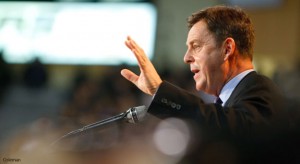 One of my favorite living preachers is Alistair Begg. I find him to be a model of convictional clarity in exposition. There is an art and unction to his preaching uncommon in our time.
One of my favorite living preachers is Alistair Begg. I find him to be a model of convictional clarity in exposition. There is an art and unction to his preaching uncommon in our time.
If you want to find out more about Begg’s thoughts on preaching you can reach for his little booklet Preaching for God’s Glory. One section of the work that is particularly helpful is on his own method of sermon preparation. He mentions five points he “learned from an older minister when [he] was a theological student.”1
THINK YOURSELF EMPTY
“It is helpful if we can survey the passage in a proper spirit of unlearnedness. We do not want to be uncertain by the time our study ends, but it is all right and often beneficial to avoid the proud assumption that we know initially what everything means . . . In this stage I write down anything that comes to mind – parallel passages, possible illustrations, textual difficulties, poems, hymn quotes, a sketchy outline if it emerges naturally.”
READ YOURSELF FULL
“The pastor should read widely and regularly. There are certain books we should return to routinely: Baxter’s The Reformed Pastor, Augustine’s Confessions, and as daunting as we may find it, Calvin’s Institutes. I also find great profit in reading biographies. The two volumes on Lloyd-Jones should be a prerequisite for all pastors, as well as at least the first volume on Whitefield by Arnold Dallimore. . . . We must learn to benefit from these resources without becoming tied to them or allowing their insights to rob us of the necessary personal experience of discovery and creativity.”
WRITE YOURSELF CLEAR
“Aside from the essential empowering of the Holy Spirit, if there is one single aspect of sermon preparation that is most closely tied to fluency of speech and impact in delivery, it is this: freedom of delivery in the pulpit depends upon careful organization in the study. We believe that we have a grasp of the text and that we are clear about our delivery, only to stand up and discover that somewhere between our thinking and our speaking things have gone badly awry. The missing link can usually be traced to the absence of putting our thoughts down clearly.”
PRAY YOURSELF HOT
“There is no chance of fire in the pews if there is an iceberg in the pulpit; and without personal prayer and communion with God during the preparation stages, the pulpit will be cold. . . . We dare not divorce our preaching from our praying. . . . We can do more than pray, after we have prayed, but not until. How easy it is to affirm this, and yet how difficult to practice.”
BE YOURSELF, BUT DON’T PREACH YOURSELF
“There is nothing quite so ridiculous as the affected tone and adopted posture of the preacher who wishes he was someone else. . . . James Stewart used to say, “Be yourself, but also, forget yourself!” Self-forgetfulness is of vital importance. We cannot make much of ourselves and much of the Lord Jesus Christ simultaneously. If people leave worship saying, “What an amazing preacher!” we have failed. Instead we must long for them to say, “What a great God, and what a privilege it is to meet him in his Word, as we have just done.”
- In Between Two Worlds John Stott mentions a very similar method saying, “The whole process from beginning to end, was admirably summed up the by American Black preacher who said, ‘First, I reads myself full, next I thinks myself clear, next I prays myself hot, and then I lets go.” ↩
